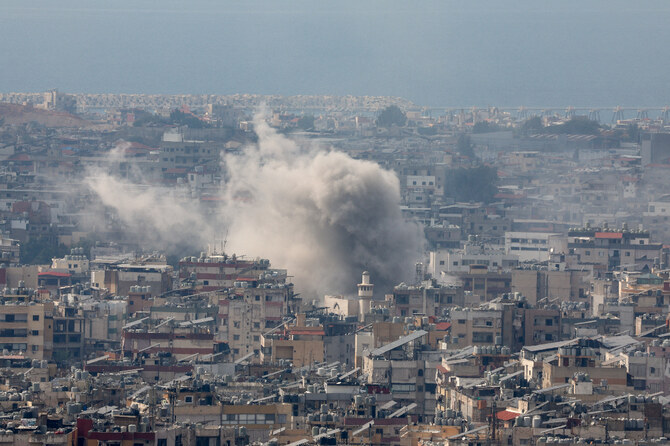BEIRUT: Heavy Israeli airstrikes continued in Lebanon on Sunday, hitting Beirut and the Bekaa Valley.
The Ministry of Health recorded at least 23 deaths along with 93 injuries in a single day of airstrikes.
The Order of Nurses in Lebanon issued an urgent appeal to the international community, the World Health Organization, and the International Council of Nurses “to intervene quickly and pressure Israel to shield the healthcare sector from the devastating war that has spared neither people nor buildings.”
It warned that “the attacks have reached the healthcare sector, targeting hospitals that are beginning to go out of service, and targeting doctors, nurses, and paramedics in a blatant defiance of international laws and conventions.”
It also cautioned that “the rapid developments, which have so far claimed many lives of healthcare workers and paramedics, have made it very difficult to remain in hot areas to rescue the wounded, especially as the lives of nurses are now at risk.”
Suleiman Haroun, head of the private hospital owners’ syndicate in Lebanon, warned on Sunday that the hospital sector had “entered a danger zone.”
He said the crisis was fuelled by Israeli shelling near hospitals in the south and Beirut’s southern suburbs amid the massive displacement of people.
Haroun said: “The problem we currently face is providing beds for intensive care patients, ventilators, and beds for dialysis patients.
“We have been affected by the massive displacement of residents from the South, Bekaa, and Beirut’s southern suburb.
“The capacities of hospitals in safer areas have become less than what is needed.
“Hospitals still operating in the areas under Israeli attacks are evacuating their patients to other hospitals to make room for more wounded.”
Lebanon has 125 private hospitals providing medical services to many Lebanese citizens alongside government hospitals.
Twenty of these hospitals are in the country’s south, a similar number in Bekaa, and five in Beirut’s southern suburbs.
These hospitals have been subjected to Israeli shelling, reducing their operations to minimal levels, focusing only on emergency cases, Haroun said.
For instance, 19 patients are on ventilators in Al-Rassoul Al-Aazam Hospital.
Haroun said there was “no problem securing medical supplies or oxygen, as two factories are providing it, and they are outside the areas of the attacks.”
A witness told Arab News that streets once known for their dense buildings had become empty squares filled with rubble.
“The destruction seems infinite, and it is impossible to recognize any landmarks,” said the resident.
“We find ourselves unable to sleep as we constantly check our phones, awaiting Israeli alerts directed at the residents of the area after midnight, instructing us to evacuate,” the witness said.
“We place our hands over our hearts, fearing that our homes, which are all we have left, may be targeted. They claim to be concerned for our safety.
“Yet they seek revenge against us and punish the wounded by obstructing ambulances from reaching the sites of the bombings ... this is the pinnacle of criminality,” the witness added.
Emergency responders continue to face challenges in reaching targeted areas due to the surveillance of drones monitoring any movement in the vicinity, particularly in the southern suburbs.
The South Lebanon Water Establishment mourned the death of three staff members —Ali Sobhi Mansour, Hussein Raslan from Taybeh, and Karim Darwish from Nabatieh — who all died while working.
Israeli raids targeting the vicinity of the Palestinian refugee camps in Burj Al-Barajneh and Shatila facing the Ghobeiry area, meanwhile, led to the displacement of camp residents.
Refugees and a mix of non-Lebanese camp residents spread out on the roads in the heart of Beirut and around Horsh Beirut, where they sat in the open.
Israeli airstrikes resumed on Sunday afternoon on the southern suburbs, targeting the areas of Burj Al-Barajneh and Chiyah-Ghobeiry, following a morning airstrike on an area between Al-Laylaki and Mrayjeh.
A residential building collapsed in Burj Al-Barajneh as a result of the strike’s damage.
The Israeli airstrikes targeted the vicinity of the historic Roman Baalbek Citadel, with plumes of smoke observed ascending from the area.
The governor of Baalbek-Hermel, Bachir Khodr, verified that an assessment of the strike site revealed it was 600 meters from the citadel.
Airstrikes targeting a residential building in the town of Shmustar collapsed the structure, bringing it down on the heads of women, children and the elderly within.
Israeli airstrikes also targeted Qasr Naba, Talia, Temnin El-Fawqa, the town of Douris east of Baalbek, and Ali El-Nahri in the central Bekaa region.
Hezbollah reported ongoing military operations on the southern front against Israeli military installations, including “an aerial assault utilizing a squadron of suicide drones on the Samson base, which serves as a command supply center and regional supply unit, aiming at the positions of Israeli officers and soldiers.”
The group also targeted “the movement of Israeli troops at the Biyad Blida site with artillery fire,” “the Hadab Yarin site using rocket munitions,” and “the Shlomi settlement.”
Furthermore, when an Israeli unit attempted to infiltrate Khallet Shuaib in Blida, Hezbollah responded with artillery fire, compelling the unit to withdraw and resulting in casualties.
Hezbollah said it launched a rocket barrage against Israel’s operation on Sunday to evacuate wounded and deceased soldiers from the Manara settlement.
The Israeli military announced on Sunday that around 40 rockets were fired from Lebanon targeting northern Israel.
Sirens were sounded in the Metula and Kiryat Shmona areas.
Some rockets were intercepted, while others landed in the vicinity.
Israeli army radio announced the interception of two ballistic missiles that were launched from Lebanon.
It said debris from one of the missiles fell in southern Haifa and appeared to be of the Fateh 110 type.




























